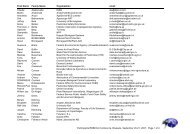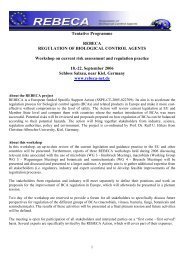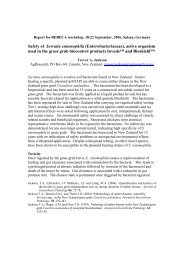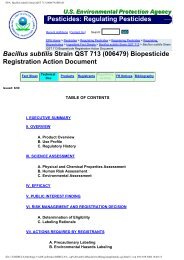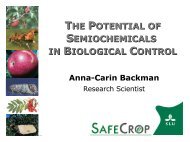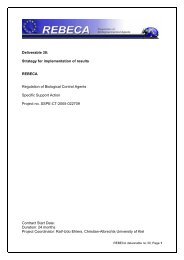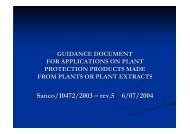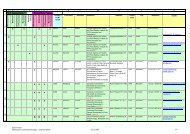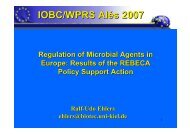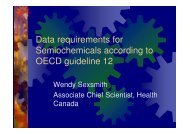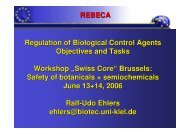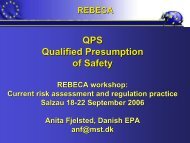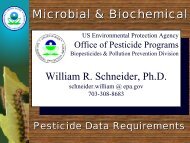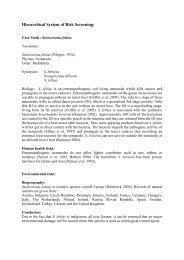Deliverable 28: Specification of low risk products REBECA ...
Deliverable 28: Specification of low risk products REBECA ...
Deliverable 28: Specification of low risk products REBECA ...
Create successful ePaper yourself
Turn your PDF publications into a flip-book with our unique Google optimized e-Paper software.
Regulator’s experiences in defining <strong>low</strong> <strong>risk</strong> <strong>products</strong><br />
At the <strong>REBECA</strong> stakeholder meeting for regulators which took place in Salzau,<br />
Germany on 18 September 2006 (a meeting attended by 27 regulators from Europe,<br />
Australia and USA) the participants discussed the possibility <strong>of</strong> the national<br />
authorities to give priority to <strong>low</strong> <strong>risk</strong> <strong>products</strong> during the evaluation and authorisation<br />
process.<br />
This issue had been discussed in Sweden, the Netherlands and in the UK. The<br />
purpose in all three countries was to increase the number <strong>of</strong> such <strong>products</strong> at their<br />
market e.g. by reducing the fee requested for <strong>low</strong> <strong>risk</strong> <strong>products</strong> and in the<br />
Netherlands and the UK also to provide further guidance to applicants in order to<br />
speed up the preparation <strong>of</strong> dossiers and the subsequent evaluation <strong>of</strong> those dossier.<br />
However, none <strong>of</strong> the regulatory authorities in the three countries found the term “<strong>low</strong><br />
<strong>risk</strong>” very helpful, simply due to the difficulties in defining such a category. In the UK<br />
the Pesticide Safety Directorate (PSD) has not used the term <strong>low</strong> <strong>risk</strong> <strong>products</strong> in<br />
their BioPesticide Scheme but instead the term alternative <strong>products</strong> (however, also<br />
without a specific definition). For this product group they have <strong>low</strong>ered the fees, are<br />
arranging pre-submission meetings, they have increased the web-site information <strong>of</strong><br />
the regulatory process, established a specific contact point in PSD for these product<br />
types (a champion) and the applicants can be guided throughout the process <strong>of</strong><br />
putting together an application.<br />
A somewhat similar project is taking place in the Netherlands, where the project is<br />
called GENOEG. It is also aiming at getting further <strong>low</strong> <strong>risk</strong> <strong>products</strong> on the market.<br />
In the Netherlands they have used the term natural pesticides rather than <strong>low</strong> <strong>risk</strong><br />
<strong>products</strong>. Via this project the applicants can get up to 100,000 € co-finance for<br />
registration fees and extra studies needed for the <strong>risk</strong> assessment, and the<br />
regulatory authority here also help applicants put together good dossiers and invite<br />
applicants for pre-submission meetings.<br />
QPS – Qualified Presumption <strong>of</strong> Safety<br />
At several <strong>REBECA</strong> workshops the EFSA initiative on developing a QPS concept<br />
(Qualified Presumption <strong>of</strong> Safety) was discussed. The reason being that it was<br />
anticipated, that if the microbial plant protection <strong>products</strong> were included in the<br />
development <strong>of</strong> this new concept, it would be a way <strong>of</strong> defining groups <strong>of</strong> <strong>low</strong> <strong>risk</strong><br />
micro-organisms, and a way <strong>of</strong> obtaining a faster evaluation and market introduction<br />
<strong>of</strong> microbial plant protection <strong>products</strong>.<br />
The development <strong>of</strong> a QPS concept was initiated in 2003 by a working group<br />
consisting <strong>of</strong> members <strong>of</strong> several former (EC) scientific committees. The work was<br />
continued within an EFSA working group. The aim was to develop a scheme that<br />
would harmonize the <strong>risk</strong> assessment <strong>of</strong> micro-organisms throughout the various<br />
EFSA panels and a scheme developed as a tool for setting priorities within the <strong>risk</strong><br />
assessment <strong>of</strong> micro-organisms used in food/feed. By using this tool <strong>risk</strong> assessors<br />
will for some micro-organisms be able to take a generic approach in the <strong>risk</strong><br />
assessment instead <strong>of</strong> a full case-by-case assessment, and in this way make better<br />
use <strong>of</strong> assessment resources by focussing on those organisms that present greatest<br />
<strong>risk</strong> or uncertainties, and which would need a case-by-case <strong>risk</strong> assessment.<br />
6



